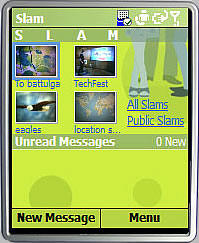Myspace out, Second Life in?
If you have the time then do a content analysis of news items of Myspace and Second Life, then you will find more negative stories about Myspace and Positive vibes about Second Life. Today's favorite Second Life story being how teachers are using Second Life in education.
Myspace quotes of the week“MySpace is like on Christmas morning...and you go downstairs and you see the presents under the tree… I sign on and it’s like, dah-dah!”
- A Teen at
Web 2.0 conference'Myspace is Dead'
ORDINARY BOYS singer PRESTON
thinks the music community aspect of Myspace is 'dead', because established acts are using Myspace to target fans and sell albums, thus crowding out smaller acts.
Web 2.0 startup costs
Starting up is
cheaper than ever before. Founders can fund the essential startup costs themselves, mostly on servers and hosting in case of Web 2.0 startups.
Creating a
proof of concept is easy now. Web 2.0 startup founders know that it is essential to start ASAP, create a basic application and put it in front of a core users' group who do the testing, suggesting and viral spread work. Bootstrapping is in a big way.
VCs often do not come in the picture.
- Digg was started on $99 servers and hosting.
- Excite Founder Joe Kraus’s new startup JotSpot, was started on just $100,000.
- Meebo founders financed the startup themselves by using their credit cards to the tune of $2,000 apiece.
Smaller VC funds are inPaul Graham’s Y Combinator has a
rule of thumb: it invests in start-ups at $6,000 per employee.“C.S. grad students at M.I.T. currently get $2,000/month to live on, so this represents three months’ living expenses. Though in fact most groups make it last longer.”
Another VC Charles River Ventures offers loans of $250,000 to entrepreneurs as a way to gain access to promising start-ups. Earlier VCs frowned on anything below $ 5 million.
Appropriately, another VC says that
$500,000 is the new $5 million.
I am thinking of creating a list of web2.0 startups and their initial funding. Media startups are also included. Help will be appreciated.
Social Networking sites ranked according to average session time
Most web 2.0 startups are still searching for proper business models. Most startups also face the original web 2.0 behemoth, a company called Google blocking their path. Either Google incorporates the new web 2.0 feature or it buys them out. I am sure many startups are pining for the second option.
A key criterion of web 2.0 success is the amount of time users spend on a site. On Digg, it is come and go. On Flickr, it is longer.
Om Malik has posted some interesting Social Networking Sites’ stats, according to Hitwise. By market size, Myspace is still the leader, follwed by Facebook with 7.24% market share.
However, I was interested in the
average session time for the sites. Apart from being a measure of stickiness to the core user, these are helpful numbers for advertisers.
I have arranged sites with biggest session times arranged in descending order. It is interesting to see the absense of any social news sites on this list.
Where is Digg?
Top Social Networking sites ranked by Average session time (U.S. visits)Gaiaonline: 47.01
Myspace: 30.22
CrushSpot: 30.31
Bebo: 25.39
Orkut: 21.33
Tagged: 20.33
Blackplanet: 20.19
Friendster: 19.52
Sconex: 18.20
Hi5: 14.31
Migente: 14.01
Livejournal: 12.27
Xanga:12.00
Yahoo 360: 11.42
myYearbook: 8.56
Facebook: 8.17
Classmates: 7.14
Piczo: 6.04
Windows Live Spaces: 4.37
Bolt: 1.43
A Guide to smartphones roundup

Although the U.S. market is skewed towards PDAs, I will not be surprised if U.S. users soon start opting for smartphones; most of the new models are coming closer to the desired feature set the customer seeks.
In October, Gartner
reported that in 2005, out of combined PDA & smartphones sales of 42.1 million units, smartphones accounted for 34.7 million with the remainder PDAs. Expected, 45% of worldwide PDA sales took place in North America while 33% of smartphones was in Japan. However, much else in consumer technology, the U.S. will soon follow Japan in adopting smartphones in a big way.
Crunchgear has recently posted a detailed review of various options for
first-time smartphone buyers.
Crunchgear also has a list of
10 things they hate in smartphones.
Gizmodo has a special section on
Smartphones.
Wikipedia has a detailed list of
smartphones.
Reviews of smartphones on Zdnet.
More
smartphones reviews here.
SLAM - Myspace for Windows based mobile devices

Microsoft has mostly played catch-up with the likes of Google for quite a while. Even the much-hyped Vista is just that - hype.
However,
SLAM, a mobile based social networking application from Microsoft Research looks promising. SLAM provides a lightweight, group-centric real-time communication, photo-sharing and location awareness functionalities on mobile devices.
Slam works via html rather than SMS. Users need to install the Slam application on their Windows Mobile based devices only. A shame, actually.
Basically SLAM is Myspace for Windows based mobile devices. One feature SLAM will soon sport is location information of people in users' Slam group.
Although SLAM is one Microsoft innovation I like, I am sure someone will copy the SLAM featue set on java and open source platform soon).
Video blogging 101
At the recently held Vloggies,
AliveinBaghdad won the top honours. That also tells us about what type of video blogging sells.
Live video blogging, event coverage, experience coverage- all the stuff that gives the viewer a feel of the situation, think of it as 'Saving Private Ryan cum Michael Moore type' documentary kind of Video blogging.
Even our beloved Amanda Congdon is moving around the United States talking to interesting people.
Ok, this is not exactly a primer on video blogging.
More on Vloggie winners:
People’s Choice
WinnersJudge’s Choice
Winners
The madness of crowds: why the time for Digg is up
As Michael Arrington at Techcunch says,
the social news site Digg continues to grow, claiming 20 million visitors per month and an increasing amount of mainstream attention. But as traffic to Digg has grown, the incentive to "game" the site to get stories to the home page has also increased.
I think the time for Digg is up.
Much has been said about the emerging model of social news, where power has shifted from the editors to the users/readers. Some talk about Democratization of news but that is pure nonsense. News is not democratic, dictatorial or anything else. News is news, period.
Digg was special in the sense that it added one likable thing to the user-powered news model -
ratings. It played to the gallery and won users in millions. But democratic it is not. In a true democracy, a voter (read rater) does not disclose who he/she has voted for. That does not help the case for independent decision making. Digg, on the other hand is reportedly dominated by a cabal of 'top' users who see to it that only their stories go to the vaunted front page. The front of Digg and rest of most-dugg stories are mostly techie stuff. Now, as Kevin Rose has set out to control their power, the top users threaten to leave Digg. This is like hijacking the democracy and soon users might be going away to other pastures.
IMHO Digg has done its bit - it made participatory journalism, even if it played only to the hard-core techie, hip.
Ratings - that will be the only thing Digg will be known for in the Internet Hall of Fame. I am not sure Digg is even worth $200 million that someone conjured up. Users do not stay long enough as they do on Flickr or Del.icio.us which Yahoo snapped for pittance.
Digg and the rest of social news Gang will soon be part of major online media properties who can add value in terms of longer site views supplemented by detailed stories and articles. The news sites need to learn from Digg and much else about social news. They have to learn how to best utilize users. For example, in law-related stories, they have to make sure it does not become a trial by the crowd. Whatever the media versions, 2.0 and so on, truth shall always prevail.
Reddit is already a part of Wired.
Next up: Digg, property of the NYT?



